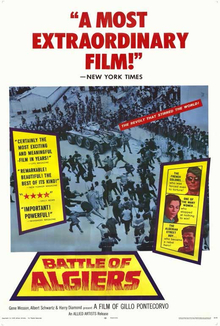Revolutions are rarely bloodless,
in fact when they are it’s a notable occasion (think the Glorious Revolution of
1688 and German Revolution of 1989) but throughout history from the American
Revolution to The Arab Spring violence has always been a major part of a civilian
uprising. The reason for this is that violence is sometimes, seemingly, the
only way to get governments to listen and even if there are instances where blood
was not shed, these are special cases.
It’s a deplorable fact of life
that political revolutions are bloody and the Algeria fight for independence was
a particularly bloody one with almost 300,000 casualties. Gillo Pontecorvo’s
The Battle of Algiers makes the Algerian war for independence its centrepiece in
this powerful story told in docu-drama style.
Shot in black and white, and in
documentary style, The Battle of Algiers is a raw and very real look at the
brutal fighting that plagued the Algerian capital for seven years. Detailing the
rebels' guerrilla warfare tactics in extensive detail The Battle Algiers works
as a historical artifact as well as a gripping, brutal and violent film about
the appalling violence during the fight for freedom and self-government of the
Algerian people.
The Battle of Algiers isn’t a film that slams
the rebels (or terrorists) or exclusively takes swipes at the French use of torture
when extracting information about the members of NLA (the French don’t
get out of this lightly). Whilst the actions of the NLA aren’t brushed over yet, it’s
clear that the film is more sympathetic towards the rebels and this is made clear in the
way the film lingers over the deaths of an Algerian family who were victims of a French bomb.
The film does undoubtedly sympathise
with the rebels but it doesn’t hide from some of their more unforgivable crimes. A scene
where a bomb is planted in a busy cafe highlights the young and innocent civilians that would fall victim to the war (the film doesn’t shy away from the brutal, systematic killings of French
policeman either). Yet this doesn't feel like film that's made with the intention to be vilify the NLA's brutal tactics because of the casiting of Saadi
Yacef which would make the film being anti NLA very unlikely.
What sits rather uncomfortably with the casting of Saadi Yacef is that feels the film it is providing too much of a service to the NLF (an organisation that is complicit in the killing of children). There’s a line, that when crossed, sympathising with the aims of a group that caused terror and committed murder for political goals is problematic and the casting of NLA leader is a step over that line. I mean, how different would it be for a film made about the IRA to cast an IRA leader in a major role?
What sits rather uncomfortably with the casting of Saadi Yacef is that feels the film it is providing too much of a service to the NLF (an organisation that is complicit in the killing of children). There’s a line, that when crossed, sympathising with the aims of a group that caused terror and committed murder for political goals is problematic and the casting of NLA leader is a step over that line. I mean, how different would it be for a film made about the IRA to cast an IRA leader in a major role?
The film’s politics is intellectually
stimulating and in terms of filmmaking it is considered Gillo Pontecorvo’s
finest achievement. Winner of the main prize the Venice film festival in 1966,
the documentary style adds a level of unrivalled realism to proceedings (so
much so that the American government watched it, in preparation for the invasion
of Iraq, to avoid making the same mistakes as the French). The use of the hand-held
camera during the riot sequences (something that must have inspired Paul
Grenngrass) is intense and gets you right in the heart of the action. Ennio Morricone's marching beat soundtrack gets one pumped, but tense, for the the battles ahead.
.
The film recognises the use or
even the necessity of political violence to achieve ones aims, but it
also makes note that this is merely a dramatic way to get discussions started
on the matter at hand. Eventually, the civilian population would need to rise
up and play their role in the revolution by simple civil disobedience. The Battle of Algiers
is a film that retains its powerful and shocking nature. Controversial on its
release it still has the strength to generate discussion about the ethics of
warfare fifty years later without feeling dated.




I'm familiar with this film by title only. That's an interesting approach to do it docu style.
ReplyDeleteWorth checking out even if it could do with some remaster improvements technically.
DeleteIt is one of the best films I had seen and certainly an uneasy film to deal with as it plays true to a lot of the things that are happening now. The fact that it was shot in a documentary style made it feel more real than it is.
ReplyDeleteAbsolutely. Civil Wars are still very much a major issue many places are facing.
Delete💛💜❤️💙🎂 Great review Myerla. I also wish there was a Wiggles Blogathon, My brother Lincoln and I are turning 21 on the 14th 🎂💛💜❤️💙
ReplyDeleteHappy birthday for the 14th :)
Delete